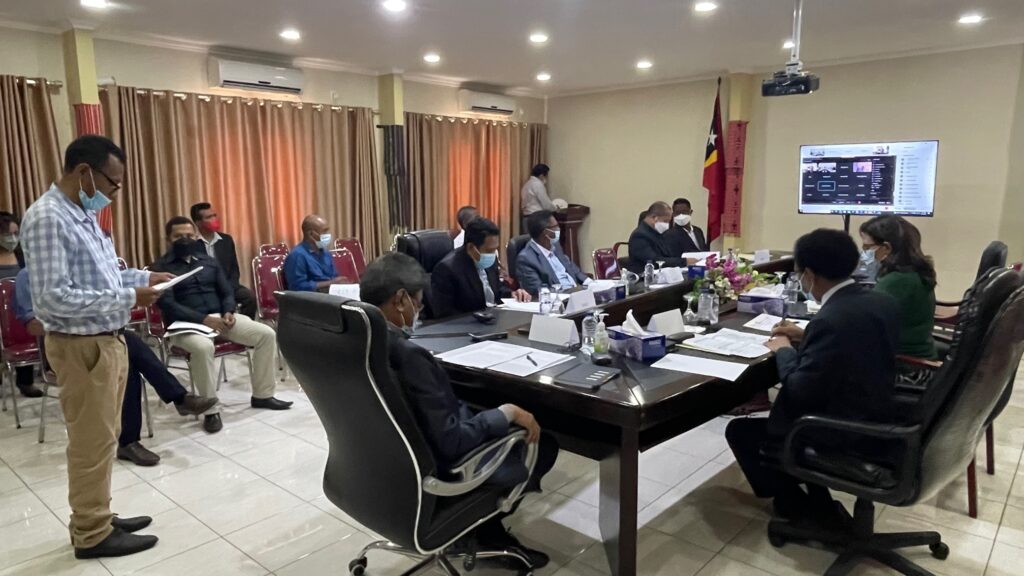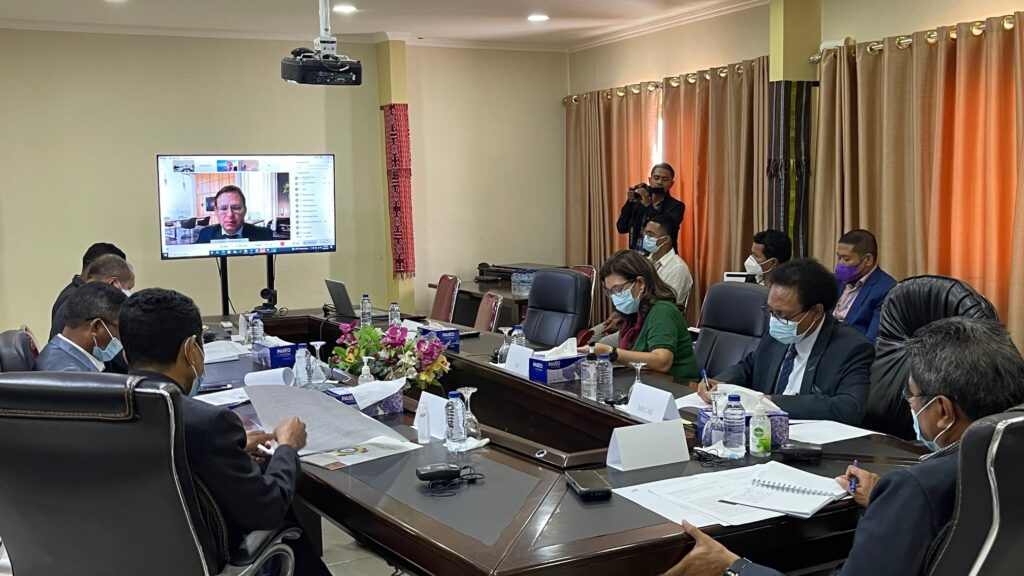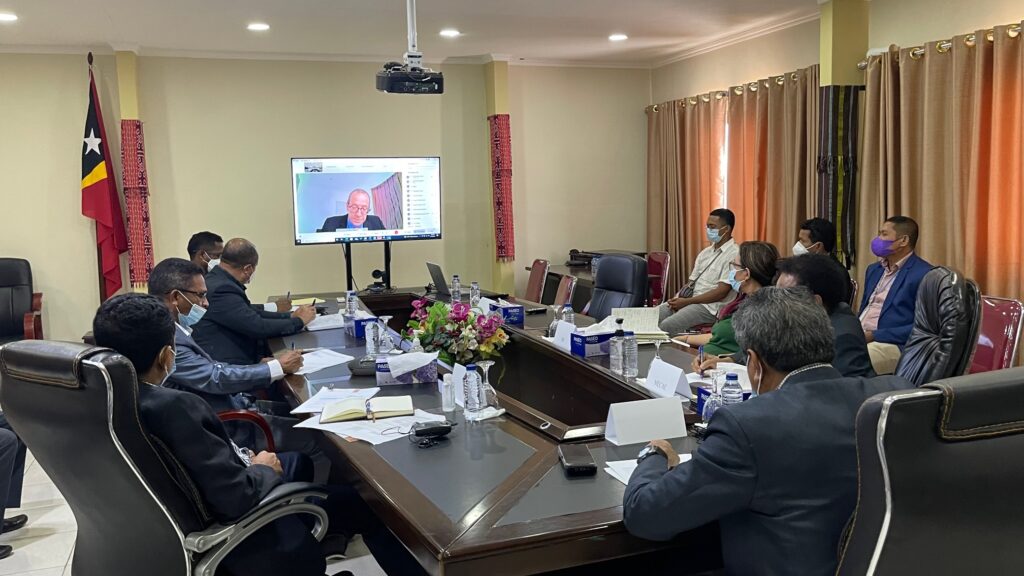Komisaun Ezekutiva BTL E.P,… – BEE Timor-Leste E.P | Facebook
Category: Uncategorized
The PPIP WSS-Innovation workshop explored successful projects reducing Non-Revenue-Water and using solar panels in the water supply and sanitation sector.
On January 21, more than 10 participants from the BEE Timor-Leste (BTL), Ministry of Planning and Territory (MOP), National Authority of Water and Sanitation (ANAS), participated in a workshop showing experience from internal projects in the water supply and sanitation (WSS) sector.

The first session by Mr. Jan Drozdz, PPIP Team Leader, presented projects to reduce non-revenue-water (NRW) in Cambodia and Vietnam. While the state-owned Phnom Penh Water Supply Authority’s spectacular success in reducing NRW from 72% to 7% was mainly due to its outstanding leadership, which paid much attention to harnessing staff knowledge and capabilities along with putting in place a clear performance framework, in Ho Chi Minh City, the key success factor to reduce NRW was to associate the private sector in performance-based contract for outsourcing technical, commercial, and construction activities related to NRW reduction, providing the contractor with incentives to achieve the desired results. Both cases raised interest from the participants, since the Dili water supply system shows high levels of NRW.
The second sessions by Dr. Brace Boyden, PPIP WSS Key Expert, presented how water utilities in Australia were able to reduce their grid energy consumption and greenhouse-gas (GHG) emissions using solar panels. Since electricity consumption is an important share of operational costs for water supply and treatment, installing solar panels can also provide important economic returns for water utilities. Some existing successful projects in Timor-Lest could be used as a reference to build on.
The PPIP, supported by the European Union and the European Investment Bank, aims to support the identification, preparation, and implementation of technically, financially, economically, environmentally, and socially sound investment projects in the forestry, solid waste, and water and sanitation sectors.
For more information please contact:
Mr Jan Drozdz, PPIP Team Leader
Email: jadrx(at)cowi.com
A digital tool for field data collection was presented at the PPIP GIS workshop attended by multiple governmental institution employees.
On December 21, employees of the Ministry of Planning and Territory, Dili Municipality Administration, Ministry of Public Works, Ministry of State Administration, Ministry of Agriculture and Fishery participated in a workshop about a digital tool for field data collection.

The PPIP, supported by the European Union and the European Investment Bank, aims to support the identification, preparation, and implementation of technically, financially, economically, environmentally, and socially sound investment projects in the forestry, solid waste, and water and sanitation sectors.
In this context, the COWI implementation team carried a field campaign to identify waste disposal sites using a digital tool for data collection. The tool was used to collect and store digital field observations, such as location, extend, characteristics, and photos of disposal sites. The workshop was the opportunity to familiarize Government employees with the tool, the ODK Collect App, and to present findings and lesson learnt from the field campaign.
Mr. Fernandinho Noronha, who took part in the field campaign stated: “It was proven during the Solid Waste Management field trip that the ODK Collect App is a very practical and easy to use tool that does not require too much training on how to use it in the field.”
Participants appreciated the fact that it could work offline and was open-source and showed interest in being able to use the tool independently. Mr. Kassius Klei, from the Ministry of Planning and Territory, concluded that this topic was of primary relevance and encouraged the organization of a second workshop to strengthen knowledge of participating institutions in the frame of the Capacity Building component of the PPIP.
For more information please contact
Mr Jan Drozdz, PPIP Team Leader
Email: jadrx(at)cowi.com
Second Project Steering Committee Meeting
10th February 2022: Today, the Second Project Steering Committee (PSC) meeting of the European Investment Bank (EIB) funded Project Preparation and Implementation Programme (PPIP)[1] was held at the Ministry of Planning and Territory.

The Second PSC meeting was represented by several Government Ministers, representatives from the European Union Delegation (EUD), the European Investment Bank (EIB), the project consultant COWI and was chaired by H.E. Eng. Joaquim Amaral, Coordinating Minister of Economic Affairs. The meeting was opened by His Excellency the Vice Prime Minister and Minister of Planning and Territory, Eng Jose Maria dos Reis who mentioned the following “I thank the European Investment Bank for its assistance and commitment to support projects focused on green activities or environment, through the development of response and capacity building, by mitigating negative impacts through climate change in the means of adaptation and mitigation of technology, human resources and financial sources. We believe that through the cooperation and technical assistance from the European Investment Bank, we can obtain the result and information which are credible”.
The Second PSC meeting agreed that the following project fiches be recommended for prefeasibility studies being: Water Sector -two cluster of cities of Aileu, Gleno and Liquica; Maliana, Suai and Ainaro. Solid Waste Management – Integrated solid waste management; Healthcare risk waste management. Forestry – Expanding commercial tree and other crops; Catchment(s) management in the watersheds of Irabere and Mota Loes.

The Head of Asia and Pacific Division, European Investment Bank, Mr Edvardas Bumsteinas commented that “the project identification stage has taken eight months to complete from the inception stage. The process has been consultative and PPIP, COWI and the Government of Timor Leste have met regularly to discuss the merits of each project. EIB is the European Climate Bank and thus climate and environment are very important factors in the identification of suitable projects. We are pleased that the GoTL has selected the 6 fiches being 2 per sector, to go onto the next prefeasibility stage. The next steps are for these 6 prefeasibility studies to translate into at least 3 feasibilities studies. Then hopefully these feasibilities could become loans from the EIB to the Govt of TL. We are more than hopeful that EIB will be able to have a fruitful relationship with the GoTL in the identification, analysis and development of many more infrastructure projects in Timor Leste. EIB is one of the largest multisectoral financial institutions in the world, and hopes to have an increasing presence in TL. We thank the GoTL and the project consultant COWI in striving to meet project deadlines even in light of the difficulties of the Covid 19 pandemic.

The Ambassador of the European Union to Timor-Leste, Mr Andrew Jacobs, mentioned that this project is coherent with the EU’s Indo-Pacific Strategy, through which the EU seeks to strengthen its partnership with the region. It sees particular opportunities in green transition, sustainability and inclusive prosperity, ocean governance, digital governance and partnership, connectivity, security and defence, and human security. This steering committee is important and will allow priority projects to be defined for investment. This is part of an extensive and meticulous process that I hope will lead to significant interventions by the EIB in support of Timor-Leste’s sustainable development ambitions.
The meeting was attended by H.E. Mr. José Maria dos Reis, Vice Prime Minister and Minister of Ministry of Planning and Territory; H.E. Mr Joaquim Amaral, Coordinating Minister of Economic Affairs; H.E. Mr. Miguel Pereira de Carvalho, Minister of State Administration; H.E. Ms. Sara Lobo Brites, Acting Minister of Finance; H.E. Mr Pedro dos Reis, Minister of Agriculture and Fisheries; H.E. Mr Andrew Jacobs, Ambassador of the EUD to Timor-Leste; Mr Edvardas Bumsteinas, Head of Asia and Pacific Division EIB; as well as other representatives from the Government of Timor- Leste, the EIB, the EU, and the PPIP Consultant COWI.
About the PPIP
The PPIP is an EIB funded project to assist the Government of Timor-Leste in the identification, preparation and implementation of technically, financially, economically, environmentally, and socially sound investment projects in three sectors of Water Supply, Sanitation and Drainage; Solid Waste Management and Forestry. PPIP will identify potential fiches in the three sectors, conduct prefeasibility studies for six projects (two per sector) and then complete three feasibility studies (one per sector). At the end of the feasibility studies, it is envisaged that the Government of Timor Leste will take out loans from EIB to fund the three investment projects.
About the project Steering Committee of PPI Programme
The Project Steering Committee of the PPIP is co-chaired by the Ministry of Planning and Territory, the Ministry of Finance, and the European Investment Bank. The Government of Timor-Leste is also represented in the PSC by the Ministry of Foreign Affairs and Cooperation, the Ministry of State Administration, Bee Timor-Leste, and the Ministry of Agriculture and Fisheries.
About the European Union
The European Union (EU) is a unique economic and political union between 27 European countries that, together, cover much of the continent. The predecessor of the EU – The European Coal and Steel Community – was created in the aftermath of the Second World War and was built on the understanding that countries that trade with one another become economically interdependent and therefore more likely to avoid conflict. In Timor-Leste the EU is the second largest donor of development aid (grant funding). The EU is committed to support Timor-Leste 2011-2030 Strategic Development plan, which aims to transform Timor-Leste into an upper-middle-income country by 2030 based on rapid, inclusive growth enabling it to improve infrastructure, worker skills, education, training and health systems, and combat poverty and malnutrition. The EU assistance focuses on green and sustainable economic recovery and development, rural development, good governance for sustainable development and gender equality.
For more information please contact:
Mr Jan Drozdz, PPIP Team Leader
[1] The Project Preparation and Implementation Programme for Timor-Leste is an EIB executed technical assistance operation which is financed from the European Development Fund, under the Investment Facility for the Pacific (IFP) and under the Cotonou Agreement.

